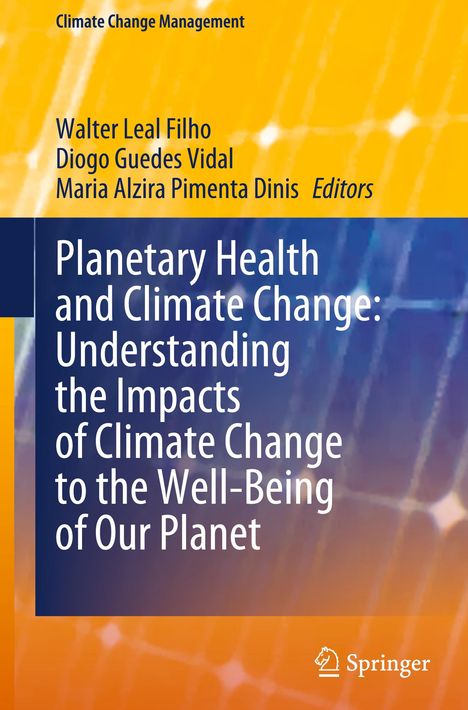Planetary Health and Climate Change: Understanding the Impacts of Climate Change to the Well-Being of Our Planet, Gebunden
Planetary Health and Climate Change: Understanding the Impacts of Climate Change to the Well-Being of Our Planet
(soweit verfügbar beim Lieferanten)
- Herausgeber:
- Walter Leal Filho, Diogo Guedes Vidal, Maria Alzira Pimenta Dinis
- Verlag:
- Springer, 12/2024
- Einband:
- Gebunden
- Sprache:
- Englisch
- ISBN-13:
- 9783031727399
- Artikelnummer:
- 12146682
- Umfang:
- 468 Seiten
- Gewicht:
- 861 g
- Maße:
- 241 x 160 mm
- Stärke:
- 31 mm
- Erscheinungstermin:
- 23.12.2024
- Hinweis
-
Achtung: Artikel ist nicht in deutscher Sprache!
Klappentext
This book aims to provide a comprehensive overview of how climate change affects planetary health and what this means for our collective future. In recent years, the discourse surrounding climate change has grown increasingly urgent and for good reasons. Our planet is undergoing unprecedented transformations driven by human activities, which are altering the delicate balance of our ecosystems. The term "planetary health" has emerged to encapsulate the interdependent relationship between the health of human populations and the health of the natural systems on which we depend. The genesis of this book lies in a simple yet profound realization: the well-being of our planet is inextricably linked to our own well-being. The air we breathe, the water we drink, the food we consume-all are products of a complex web of environmental processes that are now being disrupted by climate change. As temperatures rise, sea levels increase, and weather patterns become more erratic, the ripple effects touch every aspect of life on Earth, from human health to biodiversity, from food security to economic stability. The chapters within this book are contributions from leading experts across various fields-climate science, ecology, medicine, economics, and social sciences-each providing unique insights into the multifaceted impacts of climate change. We explore the scientific evidence of climate change and discuss the consequences for natural and human systems and potential solutions that can help mitigate these impacts. This interdisciplinary approach is needed, as the challenges posed by climate change are complex and interconnected, requiring holistic and collaborative strategies. This book does not merely catalog the problems; it also focuses on solutions. From innovative technologies to policy frameworks and grassroots movements, there are numerous pathways to a more sustainable and equitable future. The transition to a low-carbon economy, the restoration of degraded ecosystems, and the implementation of effective public health strategies are just a few of the measures that can help us navigate the challenges ahead. With its engaging narrative, richly detailed analysis, and forward-looking perspective, the book is an essential read for anyone concerned about the fate of our planet and the critical role of climate change in influencing it. It serves as a clarion call to action, urging readers to consider the legacy we wish to leave for future generations.



